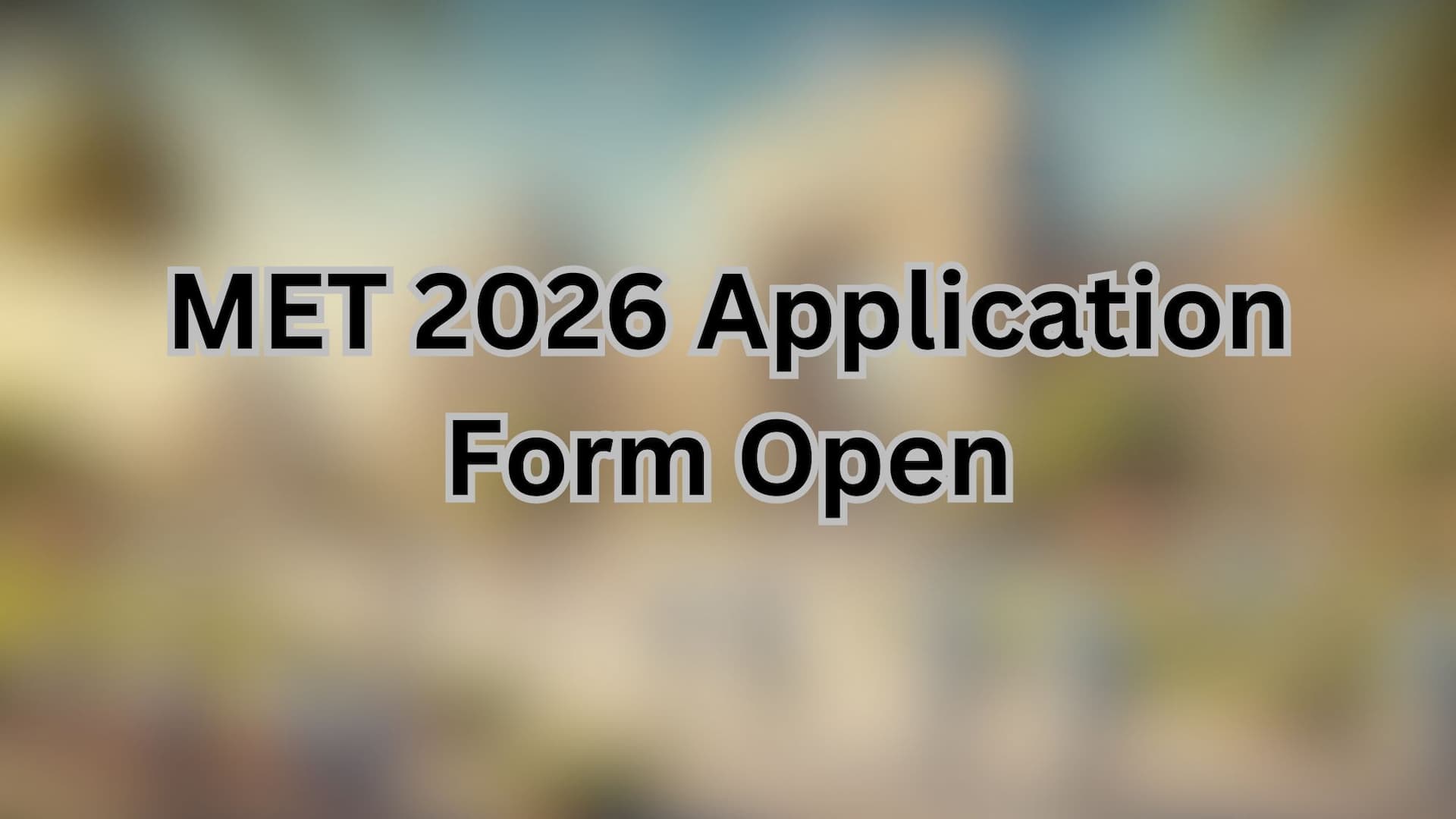The Manipal Academy of Higher Education has commenced the registration process for its entrance test for the 2026
The Manipal Academy of Higher Education (MAHE) has commenced registrations for the Manipal Entrance Test (MET) 2026 for B.Tech programs. Aspirants can apply online at the official portal, manipal.edu. The crucial deadline for Phase 1 registration is March 15, 2026. MET 2026 offers two attempts (Phase 1 in April and Phase 2 in May) with the best score considered. Get details on the exam pattern, eligibility, and the application process to join top institutes like MIT Manipal.

The path to securing admission into the prestigious engineering programs under Manipal Academy of Higher Education (MAHE), including the highly-ranked Manipal Institute of Technology (MIT), has officially opened. MAHE has initiated the online registration process for the Manipal Entrance Test (MET) 2026. This entrance exam is the mandatory gateway for admission to various undergraduate programs, particularly B.Tech, across its constituent institutions.
Aspirants are strongly encouraged to register online exclusively through the official website, manipal.edu. The application window for the crucial Phase 1 of MET 2026 is currently active, having commenced on September 30, 2025. The final submission deadline for Phase 1 applications is set for March 15, 2026. Candidates are required to furnish essential personal, academic, and contact details during the registration and form-filling process. With the examination scheduled to be held in two phases (April and May 2026), applying early ensures candidates secure their spot and gain maximum time to prepare for this competitive national-level entrance test. The flexibility of two attempts means candidates can take the test twice, with the better score being considered for the final merit list and seat allotment.
Critical Dates, Eligibility, and Application Fee
Timely application is paramount for MET 2026, as the Online Test Booking System (OTBS), where candidates choose their exam slot, operates on a first-come, first-served basis post-application.
- Key Dates for MET 2026 - Phase 1:
- Online Registration Started: September 30, 2025 (Ongoing)
- Application Deadline for Phase 1:March 15, 2026
- Online Test Slot Booking (OTBS) Start: Tentatively Early April 2026 (For Phase 1)
- Phase 1 Examination Dates (Tentative): Mid to Late April 2026
- Phase 2 Application & Exam: Phase 2 is expected to run from late March/April 2026, with the exam in May 2026.
- B.Tech Eligibility Criteria (Mandatory for MET 2026):
- Nationality: Candidates must be Indian citizens.
- Qualifying Examination: Passed 10 + 2 or an equivalent examination from a recognized Board.
- Compulsory Subjects: Must have studied Physics, Mathematics, and English.
- Optional Subject: Must include at least one of Chemistry, Biotechnology, Biology, or a relevant Technical Vocational Subject.
- Minimum Marks: A minimum of 50 % aggregate marks is required in Physics, Mathematics, and the Optional Subject taken together.
- MET 2026 Application and Test Fees:
- The total fee to be paid during the online application process is typically INR 2,000 (approx.).
- This generally includes an Application Fee (around INR 600 ) and a mandatory Entrance Test Fee (around INR 1,400 ).
- The fee is non-refundable and must be paid online via Credit Card, Debit Card, or Net Banking.
- The total fee to be paid during the online application process is typically INR 2,000 (approx.).
MET 2026 Exam Structure and Scoring Dynamics
Understanding the MET exam pattern is crucial for effective preparation. It is a Computer-Based Test (CBT) with a unique marking scheme that includes both MCQs and NAT questions.
- MET 2026 B.Tech Exam Pattern Highlights:
- Mode & Duration: Computer-Based Test (CBT) for 120 minutes ( 2 hours).
- Total Questions: 60 Questions.
- Total Marks: 240 Marks.
- Types of Questions: Multiple Choice Questions (MCQs) and Numerical Answer Type (NAT) questions.
- Syllabus Focus: The syllabus is primarily based on the 11th and 12th standard curriculum for Physics, Chemistry, and Mathematics (PCMB). The English section tests Grammar, Vocabulary, and Reading Comprehension skills. Students must concentrate on core concepts from major boards like CBSE and other state boards.
Step-by-Step Guide to Online Application
To ensure your application is successful before the March 15, 2026 deadline, follow this structured online process:
- Step 1: Initial Registration (Sign Up):
- Visit the official MAHE admission portal at manipal.edu and click on 'Apply Online'.
- Provide basic details like Name, Email ID, Mobile Number, Program (B.Tech), Stream, and Course to create a registration profile. A unique Login ID and Password will be sent to your registered email and mobile number.
- Step 2: Complete the Application Form:
- Log in using your credentials.
- Carefully fill in all sections of the application form, including personal information, guardian details, and detailed academic history (Class 10 and 12 information).
- Select your preferred Test Cities.
- Step 3: Upload Documents and Pay Fees:
- Upload the required scanned images of your Photograph and Signature in the specified format and size.
- Proceed to the payment gateway to pay the total application fee of approximately INR 2,000 online.
- Step 4: Final Submission and Printout:
- Review all details before the final submission, as no correction window is typically provided.
- Submit the form and save or print the final application form and the fee payment receipt for future reference.
- Post-Application: Slot Booking: After the application deadline, successful candidates will be able to access the Online Test Booking System (OTBS) in early April 2026 to reserve their specific exam date, time, and test center for Phase 1.
Conclusion
The commencement of MET 2026 Phase 1 registration is the critical first call for engineering aspirants seeking admission to one of India’s most reputable private universities, MAHE. With a well-defined, dual-phase exam structure that gives candidates a second chance, MET 2026 provides a fair and comprehensive assessment opportunity. Ensure your complete online application is submitted well before the March 15, 2026 deadline and focus your preparation on the 11th and 12th science syllabi, particularly keeping the mixed MCQ and NAT question pattern in mind.
